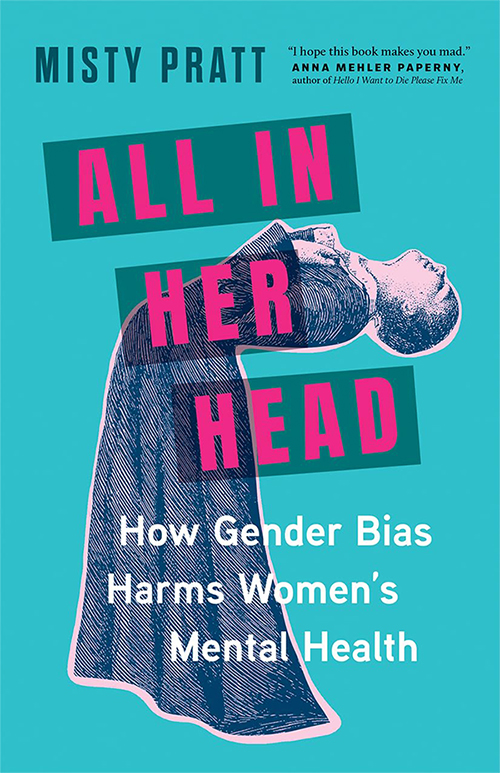Book Club – All In Her Head

Subscribe to Catalyst
Subscribe to get our magazine delivered right to your inbox
Related Articles
Subscribe to Catalyst
Subscribe to get our magazine delivered right to your inbox
Related Articles
The Book Club series profiles good reads that challenge stereotypes and stigmas – part of our Representations section on pop culture and mental health.
It’s not just gender bias – though that’s a useful umbrella term for the various societal ills, long-held beliefs, lack of data, historical hangups, and stigma that negatively impact mental health care for women.

All In Her Head
Author Misty Pratt is a science communicator and researcher based in Ottawa. She brings in medical research, interviews with practitioners, and her lived experience with mental health care into a book (Greystone Books, May 2024) that dismantles outdated concepts like hysteria, critiques the self-care industrial complex, and examines cultural constructions of mental illness.
It’s not you, it’s capitalism
In chapter 7 – titled Are You Mentally Ill or Mentally Overloaded? – Pratt underlines the link between burnout and depression, based on a study of Finnish employees. It suggests that people suffering from burnout are more likely to become depressed, while those with depression are more vulnerable to burnout.
Within this loop, Pratt notes that when women experience burnout – in a broad sense of being overly exhausted by the mental load and daily life – it is sometimes diagnosed as anxiety or depression. However, this could be a false diagnosis that overlooks larger economic and social issues – such as the patriarchy (Chapter 6) – leading to ineffective treatments.
Pratt asks readers to consider their situation more holistically. In other words, is the reason you can’t get out of bed more about the climate catastrophic world you live in, your economic situation, or a lack of power– rather than about you as a person?
Empowering eye-opener
“Personally, this realization completely changed the way I relate to myself and my mental illness,” Pratt writes. “I believe that misdiagnosing burnout feeds the illusion that mental illness is due to a personality flaw, negative mindset, my family’s genes, or an imbalance in my brain rather than an understanding that is closer to the truth: I’m facing a social problem that has real, lived emotional consequences.”
She found this realization freeing but notes it can be distressing to know you don’t have as much control over your well-being as you may have thought or been led to believe. However, a broader more fulsome view can set you “on a path to rediscover your own capacity, the ways in which you are limited, and what tiny actions of resistance you can make.”
Pratt is careful to not define what that resistance could or should look like for anyone. She checks her own biases in the book, actively avoiding what she calls the trap of “White Woman Wellness Syndrome,” that carries a privilege and often pushes simple fixes that are trendy or culturally appropriative. There are no affiliate links to jade eggs or corny affirmations to be found here. Rather, wellness culture and self-care are reimagined in a way that touches on our multitudes: spiritual, social, relational, cognitive, emotional, and financial.
Rewriting her story
Pratt shares her story of a nervous breakdown, anxiety, and depression; her strategies, sessions with therapists, and how these intersected with life stages, such as the birth of her children. She weaves in her lived experiences with trenchant analysis of contemporary research through a biopsychosocial lens (a model that looks at biological, psychological, and social factors that influence our lives).
Another through line is the story of Pratt’s grandmother, Dorothy Mavis Buckler, who was contending with bipolar disorder in the 1980s, a time when we knew much less, stigma was painfully and systemically strong, and treatments were rudimentary. Pratt recalls her view as a then-five-year-old observing her grandmother’s state.
“When we lose our mind, where does it go?” she writes. “As our mind drifts past, do we jump and try to grab at it, as a young child would chase after a wayward balloon on a windy day?”
Clinicians acted as if her grandmother’s symptoms were exaggerated. Pratt explores the narrative of hysteria and wonders what might be different now for her grandmother. Contrasted with Pratt’s own experiences and research, the reader is left with a hopeful feeling – that things have improved, even if there is so much more to do.
For example, when Pratt gets lightly “manifesto-y” toward the end, her call-to-action is so sensible and straightforward that one wonders – why aren’t we there yet?
“My wish is for all women to have access to effective biopsychosocial treatment options, to consent only once properly informed, to receive support for their preferences and values, and to have better care in coming off medication,” she writes.
“This can be done in collaboration with psychiatrists, psychologists, social workers, patient advocates, and anyone else working toward better mental health care. In other words, we can find common ground to stand on, a place where the door opens to choices for each and every individual who wants them.”
Further reading: Lifeline: An Elegy: Stephanie Kain’s novel changes the narrative on supporting someone with mental illness.
Resource: Where to Get Care – A Guide to Navigating Public and Private Mental Health Services in Canada.




